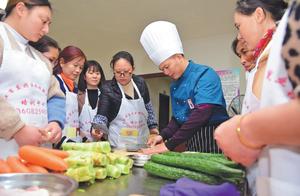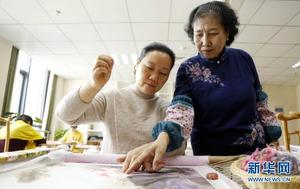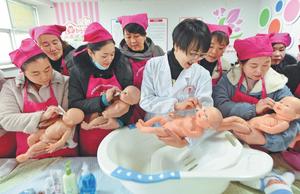The government is helping bring jobs to those whose working lives have been affected by the COVID-19 outbreak. ZHAO XINYING reports.
 Women take part in a bridal makeup competition in Hangzhou, Zhejiang province, last month. The winners were awarded nationally recognized professional certificates, which could help their careers. (LIN YUNLONG / FOR CHINA DAILY)
Women take part in a bridal makeup competition in Hangzhou, Zhejiang province, last month. The winners were awarded nationally recognized professional certificates, which could help their careers. (LIN YUNLONG / FOR CHINA DAILY)
Recently, Zhang Fuling has been busy at a vocational school near her home, learning skills that will allow her to obtain work as a professional babysitter.
The resident of Songji township, Linquan county, Anhui province, used to be a migrant worker at an electrical components factory in Jiangsu province.
However, the company was badly affected by the novel coronavirus outbreak, so Zhang returned home in search of job opportunities. That resulted in the 50-year-old attending training sessions organized by the local government.
Migrant workers’ jobs in these two industries (transportation and catering) are especially vulnerable to the COVID-19 outbreak, and some people face a high risk of becoming unemployed
Pang Shi, deputy director of the department of employment, entrepreneurship and policy assessment at the Chinese Academy of Personnel Science
During the 20-day session, Zhang and 30 other women-some of them returnee migrant workers like herself-are learning how to play with babies, give them massages and cook food and snacks for them.
When the training ends, Zhang and her peers will take an exam and those who pass will become qualified babysitters. "With the certificate, it will be easier for me to land a job in the sector," she said.
Alleviating adverse effects
The provision of vocational training for migrant workers is one of many measures being undertaken by the central government this year to boost employment among the group.
Yao Xiuping, vice-principal of the vocational school Zhang attends, said that as a county with a large number of residents who head out in search of work, Linquan regards training as a crucial way of easing the epidemic's adverse effect on the employment prospects of migrant workers.
They can enroll at seven designated schools in the county, including Yao's, to learn skills such as babysitting, flower arranging, housekeeping, performing the tea ceremony and caring for seniors.
The free training sessions at Yao's school started in mid-February. Initially, they were conducted online because of the COVID-19 outbreak, but were transferred to classrooms in mid-May.
So far, more than 3,000 migrant workers have attended classes. "Of those 3,000, about 1,000 found jobs immediately after training," Yao said.
 Students at a vocational school in Neijiang city, Sichuan province, acquire cooking skills that will help them secure jobs, in October. (TANG MINGRUN / FOR CHINA DAILY)
Students at a vocational school in Neijiang city, Sichuan province, acquire cooking skills that will help them secure jobs, in October. (TANG MINGRUN / FOR CHINA DAILY)
Pang Shi, deputy director of the department of employment, entrepreneurship and policy assessment at the Chinese Academy of Personnel Science, said many factors, particularly the global COVID-19 pandemic, pose threats to China's economy this year. That means some businesses may face production and operating problems.
"Under such circumstances, some enterprises may reduce the number of workers they recruit, making it hard for a number of migrant workers to land jobs this year," she said.
In April, a report by the National Bureau of Statistics showed that China had more than 290 million migrant workers last year, with 51 percent working in the service sector. Meanwhile, 6.9 percent were employed in the transportation and logistics industry, and an equal proportion in the lodgings and catering sector.
"Migrant workers' jobs in these two industries are especially vulnerable to the COVID-19 outbreak, and some people face a high risk of becoming unemployed," Pang said.
President Xi Jinping has repeatedly urged measures to stabilize the employment of migrant workers, encouraging those from areas with a low risk of coronavirus infection to resume work as soon as possible and ordering local governments to make more efforts to fight poverty.
In October, a report from the Ministry of Agriculture and Rural Affairs showed that the epidemic forced many migrant workers who had traveled to their hometowns for Spring Festival to stay a month longer than in previous years, which delayed their search for work.
The period immediately after China's most important holiday is traditionally a time when migrant workers look for new jobs, but some returned home because they couldn't find satisfactory posts.
 A woman learns embroidery at a public benefit program in Xingtai, Hebei province, last month. (ZHANG CHI / XINHUA)
A woman learns embroidery at a public benefit program in Xingtai, Hebei province, last month. (ZHANG CHI / XINHUA)
New measures
Wei Baigang, the ministry's chief economist, said the department had worked hard to boost migrant workers' job prospects and incomes by releasing employment information in a timely manner, organizing recruitment fairs solely for their benefit and transporting people to workplaces far from their hometowns.
The measures have started to take effect, according to Wei, who said that by late September most of the migrant workers whose prospects had been affected by the epidemic had found employment.
By the end of the third quarter, the number of rural laborers who had left home to find work had reached 179 million, a rise of 2 million from the second quarter.
Meanwhile, the average monthly income of migrant workers jumped to 4,035 yuan (US$617), marking year-on-year growth of 2.1 percent, he said.
In October, Zhang Ying, director of the employment promotion department at the Ministry of Human Resources and Social Security, spoke at a news conference in Beijing: "The employment of migrant workers is key to economic development, social stability and the improvement in living standards. We'll try our best to introduce more measures and make sure that they are implemented properly to guarantee jobs for this group," she said.
She added that as the epidemic had made it difficult for some migrant workers to find jobs outside of their hometowns, the ministry had joined with 15 other government departments to implement a series of measures aimed at boosting and securing employment opportunities.
During the outbreak, the ministry established transregional and transprovincial systems to transport migrant workers from their homes to factories, Zhang Ying said, adding that the system has helped 6 million migrant workers to resume work in large cities so far this year.
 A teacher demonstrates how to give a baby a bath at a maternity matron training program in Lianyungang, Jiangsu province, last month. (ZHANG ZHENGYOU / FOR CHINA DAILY)
A teacher demonstrates how to give a baby a bath at a maternity matron training program in Lianyungang, Jiangsu province, last month. (ZHANG ZHENGYOU / FOR CHINA DAILY)
Local work
She said the ministry has also urged migrant workers to find jobs in or near their hometowns. That would made it possible for some to work "on their own doorsteps", instead of traveling long distances.
In April, Luo Damei, a resident of Sangzhi county, Hunan province, found a job in her hometown as a tea picker at a white tea producer, aided by the local human resources department.
Before the COVID-19 outbreak, the 60-year-old had worked at a textiles factory in Fujian province for nine years, earning 6,000 to 8,000 yuan a month.
This year, the outbreak saw the factory's orders fall, which resulted in fewer people being hired and lower salaries being offered.
Given her age and realizing that she might be at a disadvantage to younger people in the job market-competition is far fiercer this year-Luo decided to act on local officials' suggestions and look for work nearer home.
In recent years, Sangzhi's white tea industry has developed quickly, leading to higher demand for workers, so Luo quickly landed a job.
Starting work at 6 am and ending at about 7 pm, she gets two or three hours of rest after midday and is paid 14 yuan for every kilogram of fresh tea she picks. She can earn at least 2,000 yuan a month this way.
Her husband, who worked with her in Fujian, is now employed at a construction site near their home, earning 2,500 yuan a month.
While their combined income doesn't compare with their earnings as migrant workers, Luo is still content.
"My current income is OK, considering that this year has been so unusual. Also, my workplace is now just a few minutes from home and the cost of living is much lower than in Fujian," she said.
"What's more, I'm no longer young and the high wages I earned by continuous hard work outside couldn't last forever. It was time to come home."
Contact the writer at zhaoxinying@chinadaily.com.cn


